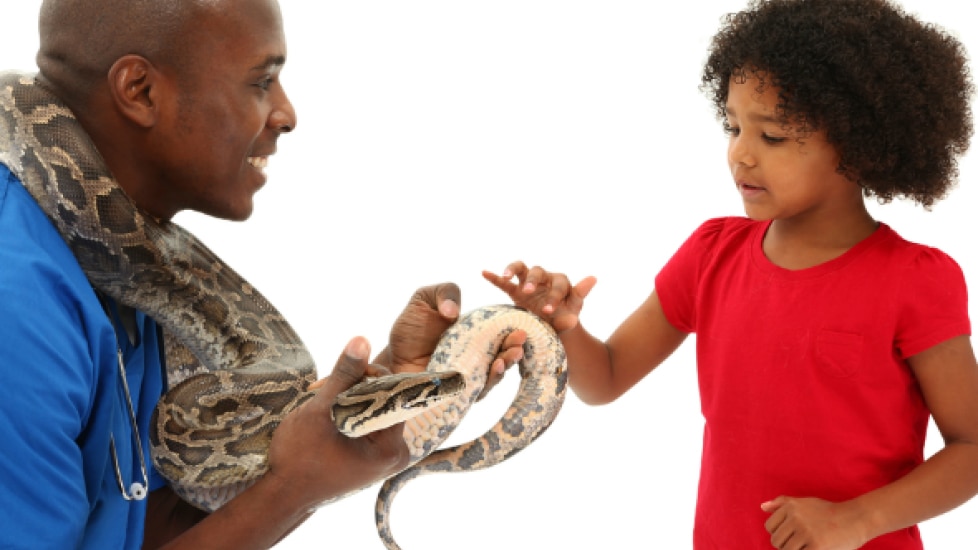Can Your Reptile Bond with You?
By Jill Fanslau
Reptiles are cold-blooded, but does that mean they’re cold-hearted, too?
Experts aren’t exactly sure if reptiles have the ability to bond with humans or not. “Unlike domesticated dogs and cats, reptiles have retained their primitive characteristics,” says Adam Denish, VMD, a veterinarian at Rhawnhurst Animal Hospital in Philadelphia and Elmwood Park Zoo in Norristown, Pennsylvania.
Dr. Denish believes reptiles show emotion—but in a limited form. “Most of their life is about basic necessities like drinking, eating, breeding, and surviving,” he says.
Two of the most obvious emotions: fear and aggression. For instance, a snake will hiss if she feels threatened and a bearded dragon lizard will puff out his beard and change its color from light brown to black when he’s mad or stressed, explains Dr. Denish.
Snakes have been known to show excitement and curiosity, too. “At the zoo,” says Dr. Denish, “we see snakes that are interested in new forms of enrichment like bedding, housing, or a new scent.”
Some reptiles will also show pleasure at human contact. Iguanas liked to be stroked on the top of the head. Turtles will hurry over toward you if reptile food is being offered.
Actual love for a human, though? That, says Dr. Denish, is difficult to prove.
But as long as you feel a connection with your pet, that’s all that matters. The more time you spend nurturing your pet, the better it’ll be for both of you. You’ll be more comfortable around one another, leading to a greater chance that a “bond” will form—whatever that bond may be.
“There’s no doubt in my mind that people can create wonderful bonds with reptiles,” says Lorelei Tibbetts, LVT, VTF, a veterinary technician who specializes in exotic pet medicine and is the hospital manager at The Center for Avian and Exotic Medicine in New York City. “It may not be the same relationship you get with another kind of pet like a dog or cat, but it’s not any less rewarding. It’s just a different bond.”
People who own reptiles aren’t getting them to snuggle, she explains. But there are other ways to feel as if you are “bonding” with them. Try some of the examples below.
1. Handle your pet.
Have you ever seen a pet snake be taken out of his enclosure? “He’ll twist around your arm. It’s like they enjoy your body heat and like being outside, not cooped up in a tank,” she says.
Bearded dragons are another species that like to be held. They’re usually fun and interactive, and like sitting on your shoulder, according to Tibbetts.
And many turtles love to have their shells scratched or rubbed, she says. In fact, many turtles will actually push into your hand if you’re petting them. They may also like having their heads or chins stroked.
But remember: Like humans, every pet will have his or her own personality. Make sure you are cautious when handling or caring for your reptile. Be aware of behaviors signaling aggression or fear. Also, wash your hands thoroughly before and after handling your pet reptile. Reptiles can be carriers of Salmonella, a bacteria which can be spread to humans.
2. Create an interesting habitat.
Spend extra time setting up reptile habitats. “A tank with a bowl inside isn’t enough,” says Tibbetts. “You need to give them things to do—places to hide, places, to climb, things to lean against. Change it up every now and then.”
That way, even if your reptile doesn’t want to be held or handled, “you’ll enjoy watching them explore their environment and take pride in caring for something beautiful in your home,” says Tibbetts. That’s a special kind of bond in and of itself.
3. Remove them from their enclosure.
You can also take some reptiles outside—as long as you watch them and make sure they can’t get lose. “Many turtles and tortoises love going outside. They like digging.”
YOU MAY ALSO LIKE
Image: Jaimie Duplass / via Shutterstock
